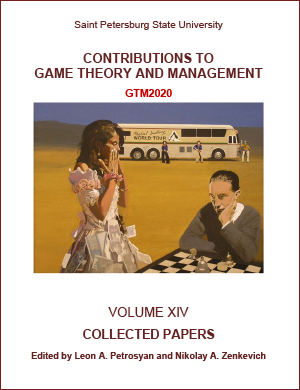New Characteristic Function for Two Stage Games with Spanning Tree
DOI:
https://doi.org/10.21638/11701/spbu31.2021.05Abstract
Two-stage n-player games with spanning tree are considered. The cooperative behaviour of players is defined. After the first stage, a specified player leaves the game with a probability that depends on the actions of all players in the first stage. A new approach to the construction of the characteristic function is proposed. In the game, all players are connected with the source directly or indirectly. Assume that the players in coalition N \ S have already connected to the source when the players in coalition S ⊂ N wish to connect to the source. The players in coalition S could connect to the source with the help of the players in coalition N \ S. A new characteristic function is defined in the game, and the Shapley value is constructed. Several results based on the new characteristic function in the two-stage stochastic game are given.
Keywords:
dynamic game, minimum cost spanning tree, Shapley value
Downloads
References
Downloads
Published
How to Cite
Issue
Section
License
Articles of "Contributions to Game Theory and Management" are open access distributed under the terms of the License Agreement with Saint Petersburg State University, which permits to the authors unrestricted distribution and self-archiving free of charge.




